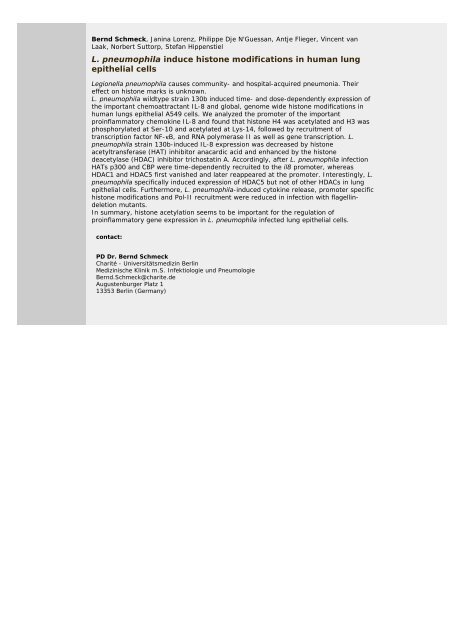Abstracts (poster) - Wissenschaft Online
Abstracts (poster) - Wissenschaft Online
Abstracts (poster) - Wissenschaft Online
You also want an ePaper? Increase the reach of your titles
YUMPU automatically turns print PDFs into web optimized ePapers that Google loves.
Bernd Schmeck, Janina Lorenz, Philippe Dje N'Guessan, Antje Flieger, Vincent van<br />
Laak, Norbert Suttorp, Stefan Hippenstiel<br />
L. pneumophila induce histone modifications in human lung<br />
epithelial cells<br />
Legionella pneumophila causes community- and hospital-acquired pneumonia. Their<br />
effect on histone marks is unknown.<br />
L. pneumophila wildtype strain 130b induced time- and dose-dependently expression of<br />
the important chemoattractant IL-8 and global, genome wide histone modifications in<br />
human lungs epithelial A549 cells. We analyzed the promoter of the important<br />
proinflammatory chemokine IL-8 and found that histone H4 was acetylated and H3 was<br />
phosphorylated at Ser-10 and acetylated at Lys-14, followed by recruitment of<br />
transcription factor NF-κB, and RNA polymerase II as well as gene transcription. L.<br />
pneumophila strain 130b-induced IL-8 expression was decreased by histone<br />
acetyltransferase (HAT) inhibitor anacardic acid and enhanced by the histone<br />
deacetylase (HDAC) inhibitor trichostatin A. Accordingly, after L. pneumophila infection<br />
HATs p300 and CBP were time-dependently recruited to the il8 promoter, whereas<br />
HDAC1 and HDAC5 first vanished and later reappeared at the promoter. Interestingly, L.<br />
pneumophila specifically induced expression of HDAC5 but not of other HDACs in lung<br />
epithelial cells. Furthermore, L. pneumophila-induced cytokine release, promoter specific<br />
histone modifications and Pol-II recruitment were reduced in infection with flagellindeletion<br />
mutants.<br />
In summary, histone acetylation seems to be important for the regulation of<br />
proinflammatory gene expression in L. pneumophila infected lung epithelial cells.<br />
contact:<br />
PD Dr. Bernd Schmeck<br />
Charité - Universitätsmedizin Berlin<br />
Medizinische Klinik m.S. Infektiologie und Pneumologie<br />
Bernd.Schmeck@charite.de<br />
Augustenburger Platz 1<br />
13353 Berlin (Germany)

















